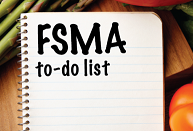

The compliance date extension affords covered entities the additional time necessary to ensure complete coordination across the supply chain in order to fully implement the final rule’s requirements

The compliance date extension affords covered entities the additional time necessary to ensure complete coordination across the supply chain in order to fully implement the final rule’s requirements

You might be the project lead on FSMA 204 and know the rule well but actually getting your company and it’s suppliers all in compliance will take a major team effort, even with the compliance deadline be extended. Regardless of what stage you’re in of your company’s compliance journey, you will always be educating someone on your team or a supplier on FSMA 204. This overview and guide will reinforce some things you already know, plus it is a great tool to share with your team and your suppliers.

As the food industry faces increasing uncertainty under the new administration and new regulations, being recall ready is more important than ever. The transition highlights the challenges that shifting federal priorities create for maintaining consistent food safety practices across our industry. Even with the most stringent food safety protocols in place, every food business is vulnerable to safety breaches – and subsequent recalls.

Safety-focused communication strengthens every link in the food supply chain. Informed employees can spot potential issues early, trained vendors can follow precise handling procedures, and educated consumers can make smarter storage decisions. When each participant understands their role in maintaining food safety, the entire system benefits through consistent quality, reduced waste, and increased market confidence.

This Episode’s theme: FDA’s FSMA 204 Traceability Rule and we’ll explore how the groundbreaking Partnership for Food Traceability (PFT) Watch the Recording

The FDA has announced steps it is taking to address concerns about elevated lead levels in cinnamon, including a latter to industry, consumer warnings, calls for voluntary recalls and pursuit of additional authority from Congress.

“Jim brings a great deal of operations and supply chain excellence experience to the company, which will be a significant asset for us, particularly as we continue to integrate the former 3M Food Safety Division into our business.”

Food organizations are undertaking a wide variety of data-oriented technology initiatives and face a profusion of technology solutions vying for attention, nearly all promising new levels of insight and productivity. While the landscape is complex, there are five basic steps that teams can take to help ensure that their technology investments are set up for long-term success.

To meet the goal of improving the food supply, the European Union (EU) has proposed new laws restricting the use of pesticides and other contaminants on crops across all member states. Analysis by liquid chromatography-mass spectrometry can provide the data to guide decision-making about changes to farming practices necessary to produce safe, healthful crops.

The challenge of complete supply chain compliance from one end of the spectrum to the other warrants cooperation across many lines: state, national, linguistic, cultural and economic to name a few. The need for intuitive solutions and an easy to implement process is paramount.